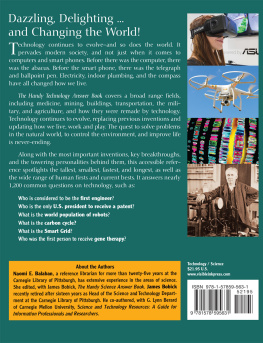Ehrenreich - Natural Causes
Here you can read online Ehrenreich - Natural Causes full text of the book (entire story) in english for free. Download pdf and epub, get meaning, cover and reviews about this ebook. year: 2018;2009, publisher: Grand Central Publishing, genre: Romance novel. Description of the work, (preface) as well as reviews are available. Best literature library LitArk.com created for fans of good reading and offers a wide selection of genres:
Romance novel
Science fiction
Adventure
Detective
Science
History
Home and family
Prose
Art
Politics
Computer
Non-fiction
Religion
Business
Children
Humor
Choose a favorite category and find really read worthwhile books. Enjoy immersion in the world of imagination, feel the emotions of the characters or learn something new for yourself, make an fascinating discovery.
- Book:Natural Causes
- Author:
- Publisher:Grand Central Publishing
- Genre:
- Year:2018;2009
- Rating:5 / 5
- Favourites:Add to favourites
- Your mark:
- 100
- 1
- 2
- 3
- 4
- 5
Natural Causes: summary, description and annotation
We offer to read an annotation, description, summary or preface (depends on what the author of the book "Natural Causes" wrote himself). If you haven't found the necessary information about the book — write in the comments, we will try to find it.
Wisdom 2.0addresses the challenge of our age:to not only live connected to one another through technology,but to do so in ways that are beneficial, effective, and useful.
Natural Causes — read online for free the complete book (whole text) full work
Below is the text of the book, divided by pages. System saving the place of the last page read, allows you to conveniently read the book "Natural Causes" online for free, without having to search again every time where you left off. Put a bookmark, and you can go to the page where you finished reading at any time.
Font size:
Interval:
Bookmark:

Copyright 2018 by Barbara Ehrenreich
Jacket design and illustration by Jarrod Taylor
Jacket copyright 2018 by Hachette Book Group, Inc.
Hachette Book Group supports the right to free expression and the value of copyright. The purpose of copyright is to encourage writers and artists to produce the creative works that enrich our culture.
The scanning, uploading, and distribution of this book without permission is a theft of the authors intellectual property. If you would like permission to use material from the book (other than for review purposes), please contact permissions@hbgusa.com. Thank you for your support of the authors rights.
Twelve
Hachette Book Group
1290 Avenue of the Americas, New York, NY 10104
twelvebooks.com
twitter.com/twelvebooks
First Edition: April 2018
Twelve is an imprint of Grand Central Publishing. The Twelve name and logo are trademarks of Hachette Book Group, Inc.
The publisher is not responsible for websites (or their content) that are not owned by the publisher.
The Hachette Speakers Bureau provides a wide range of authors for speaking events. To find out more, go to www.hachettespeakersbureau.com or call (866) 376-6591.
Library of Congress Cataloging-in-Publication Data has been applied for.
ISBNs: 978-1-4555-3591-0 (hardcover), 978-1-5387-3092-8 (large-print hardcover), 978-1-4555-3588-0 (ebook)
E3-20170825-DANF
As a teenager, I aspired to be a scientist, but too many things happened to distract me from that goal, so I became instead a science appreciator. I am not willing to spend my life in a laboratory or observatory, patiently recording measurements, but I am eager to read the reports of those who do, whether the subject is astronomy or biochemistry, and I generally consume those reports in pre-masticated forms, like Discover or Scientific American. Ten years ago, in the latter magazine, I found something so deeply upsetting that I could only think, This changes everything.
The article, written by one of Scientific Americans editors, reported that the immune system actually abets the growth and spread of tumors, which is like saying that the fire department is indeed staffed by arsonists. We all know that the function of the immune system is to protect us, most commonly from bacteria and viruses, so its expected response to cancer should be a concerted and militant defense. As a graduate student, I had worked in two different laboratories dedicated to elucidating the defenses mounted by the immune system, and had come to think of it as a magical and for the most part invisible protective cloak. I could walk through the valley of the shadow of death, so to speak, or expose myself to deadly microbes, and know no evil, because my immune cells and antibodies would keep me from harm. But here they weregoing over to the other side.
I half hoped that the accusations against the immune system would be refuted in a few years and end up in the dustbin of irreproducible results. But they persisted and are today openly acknowledged by the relevant specialists, though not without a certain queasiness, indicated by the frequent use of the word paradoxical. This is not the kind of word that one expects to find in the scientific literature, which is what I had moved on to from the popular magazines. In science, if something appears to be a paradox, then you have a lot more work to do until you solve itor, of course, abandon some of your original assumptions and search for a new paradigm.
The paradox of the immune system and cancer is not just a scientific puzzle; it has deep moral reverberations. We know that the immune system is supposed to be good, and in the popular health literature we are urged to take measures to strengthen it. Cancer patients in particular are exhorted to think positive thoughts, on the unproven theory that the immune system is the channel of communication between ones conscious mind and ones evidently unconscious body. But if the immune system can actually enable the growth and spread of cancer, nothing may be worse for the patient than a stronger one. He or she would be better advised to suppress it, with, say, immunosuppressive drugs or perhaps negative thoughts.
In the ideal world imagined by mid-twentieth-century biologists, the immune system constantly monitored the cells it encountered, pouncing on and destroying any aberrant ones. This monitoring work, called immunosurveillance, supposedly guaranteed that the body would be kept clear of intruders, or any kind of suspicious characters, cancer cells included. But as the century came to a close, it became increasingly evident that the immune system was not only giving cancer cells a pass and figuratively waving them through the checkpoints. Perversely and against all biological reason, it was aiding them to spread and establish new tumors throughout the body.
I took this personally. For one thing, I had been diagnosed with breast cancer in 2000, and this is one of the many types of cancer that has been found to be enabled by the immune system. Mine had only spread to a lymph node at the time of its discovery, but from there it was poised to strike out to, God forbidas the doctors always piously put itthe liver or bones. My other personal connection had to do with the kind of immune cells that have turned out to do the enabling of cancers spread; these are called macrophages, meaning big eaters.
As it happens, I know more about macrophages than I do about any other human cell type, which is not to say I know very much. But for a variety of reasons, I had ended up doing my graduate research on macrophages, and not because of their involvement in cancer, which was completely unsuspected at the time. Macrophages are considered the frontline defenders in the bodys unending struggle against microbial invaders. They are large, relative to many other body cells, they kill microbes by eating them, and they are usually ravenous. I cultured macrophages in glass flasks, studied them through a microscope, labeled particles within them with radioactive markers, and generally did all the things a grad student could do to understand these tiny life forms. I thought they were my friends.
In the meantime I had gone on to study and report on events at a far vaster scalewhole human bodies and, beyond them, societies. As an amateur sociologist, I had seen the health care system in my own country grow from a cottage industry to a three-trillion-dollar-a-year enterpriseemploying millions, dominating neighborhoods and even skylines, setting off political fights over who should pay for it, and dooming politicians who choose the wrong answer. And what does this enterprise have to offer those who are not actually employed by it? Longevity is promised, among other things including freedom from disability, safe childbirth, and healthy babies. In a word, it offers us controlnot control over our government or social milieu, but over our own bodies.
The more ambitious among us seek to control the people around them, their employees, for example, and subordinates in general. But even the most unassuming and humble of us is expected to want to control what lies within the perimeter of our own skin. We avidly seek to control our weight and shape through diet and exercise and, if all else fails, surgical intervention. The entire penumbra of thoughts and emotions that originates in our physical bodies also demands attention and manipulation. We are told since childhood to control our emotions and are offered dozens of algorithms for doing so as we grow older, from meditation to psychotherapy. At older ages, we are urged to preserve our intellects by playing mentally challenging games like Lumosity and Sudoku. There is nothing about ourselves that is not potentially subject to our control.
Font size:
Interval:
Bookmark:
Similar books «Natural Causes»
Look at similar books to Natural Causes. We have selected literature similar in name and meaning in the hope of providing readers with more options to find new, interesting, not yet read works.
Discussion, reviews of the book Natural Causes and just readers' own opinions. Leave your comments, write what you think about the work, its meaning or the main characters. Specify what exactly you liked and what you didn't like, and why you think so.
















